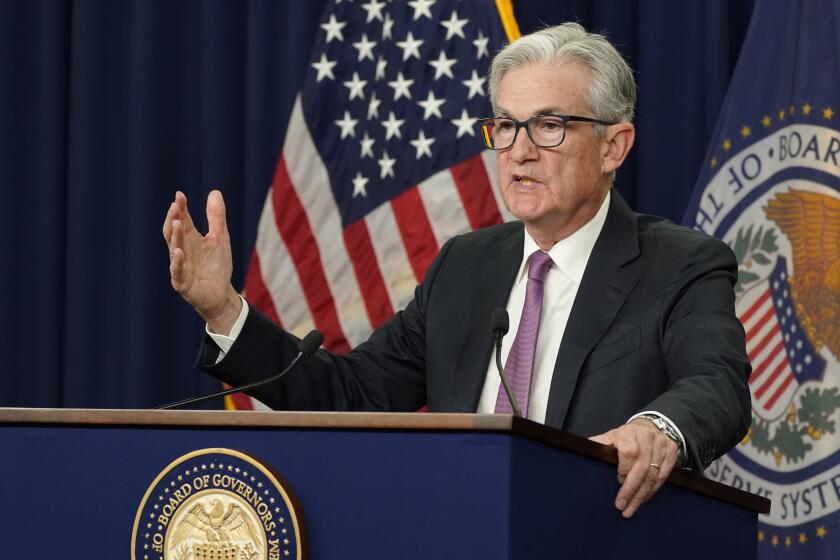Investors dump shares; Dow’s close is its lowest since 2020

- Share via
Markets sold off around the world on mounting signs the global economy is weakening just as central banks raise the pressure even more with additional hikes to interest rates.
The Dow Jones industrial average fell 1.6%, closing at its lowest level since late 2020. The Standard & Poor’s 500 fell 1.7%, close to its 2022 low set in mid-June, while the Nasdaq composite slid 1.8%.
The selling capped another rough week on Wall Street, leaving the major indexes with their fifth weekly loss in six weeks.
Energy prices also closed sharply lower as traders worried about a possible recession. Treasury yields, which affect rates on mortgages and other kinds of loans, held at multiyear highs.
European stocks fell just as sharply or more after preliminary data suggested business activity there had its worst monthly contraction since the start of 2021. Adding to the pressure was a new plan announced in London to cut taxes, which sent U.K. yields soaring because it could ultimately force the central bank to raise rates even more sharply.
As Southern California real estate gets more expensive, some buyers are changing their definition of a starter home.
The Federal Reserve and other central banks around the world aggressively raised interest rates this week in hopes of undercutting high inflation, with more big increases promised for the future. But such moves also put the brakes on their countries’ economies, threatening recessions as growth slows worldwide. Besides Friday’s discouraging data on European business activity, a separate report suggested U.S. activity is also still shrinking, though not quite as much as in earlier months.
“Financial markets are now fully absorbing the Fed’s harsh message that there will be no retreat from the inflation fight,” Douglas Porter, chief economist at BMO Capital Markets, wrote in a research report.
Mortgage interest rates have climbed steadily for the last six weeks, despite the unwavering message from the Fed about its plans. Evidently, markets are starting to take that message seriously.
U.S. crude oil prices tumbled 5.7% to their lowest levels since early this year on worries that a weaker global economy will burn less fuel. Cryptocurrency prices also fell sharply because higher interest rates tend to hit hardest the investments that look the priciest or the most risky.
Even gold fell in the worldwide rout, as bonds paying higher yields make investments that pay no interest look less attractive. Meanwhile the U.S. dollar has been moving sharply higher against other currencies. That can hurt profits for U.S. companies with lots of overseas business, as well as put a financial squeeze on much of the developing world.
The S&P 500 fell 64.76 points to 3,693.23, its fourth straight drop. The Dow, which at one point was down more than 800 points, lost 486.27 points to close at 29,590.41. The Nasdaq fell 198.88 points to 10,867.93.
Smaller-company stocks did even worse. The Russell 2000 fell 42.72 points, or 2.5%, to 1,679.59.
More than 85% of stocks in the S&P 500 closed in the red, with technology companies, retailers and banks among the biggest weights on the benchmark index.
The Federal Reserve on Wednesday lifted its benchmark rate, which affects many consumer and business loans, to a range of 3% to 3.25%. It was near zero at the start of the year. The Fed also released a forecast suggesting its benchmark rate could be 4.4% by the year’s end, a full point higher than envisioned in June.
Treasury yields have climbed as interest rates rose. The yield on the two-year Treasury, which tends to follow expectations for Federal Reserve action, rose to 4.19% from 4.12% late Thursday. It is trading at its highest level since 2007. The yield on the 10-year Treasury, which influences mortgage rates, slipped to 3.68% from 3.71%.
Goldman Sachs strategists say the higher rates mean a majority of their clients believe a “hard landing” that pulls the economy sharply lower is inevitable. The question for them is just on the timing, magnitude and length of a potential recession.
Higher interest rates hurt all kinds of investments, but stocks could stay steady as long as corporate profits grow strongly. The problem is that many analysts are beginning to cut their forecasts for upcoming earnings because of higher rates and worries about a possible recession.
Economically speaking, the vibes are off. Here’s what you should be doing with your money, according to financial experts.
“Increasingly, market psychology has transitioned from concerns over inflation to worries that, at a minimum, corporate profits will decline as economic growth slows demand,” said Quincy Krosby, chief global strategist for LPL Financial.
In the U.S., the job market has remained remarkably solid, and many analysts think the economy grew in the summer quarter after shrinking in the first six months of the year. But the encouraging signs also suggest the Fed may have to raise rates even higher to get the cooling needed to bring down inflation.
Some key areas of the economy are already weakening. Mortgage rates have reached 14-year highs, causing sales of existing homes to drop 20% in the last year. But other areas that do best when rates are low are also hurting.
In Europe, meanwhile, the already fragile economy is dealing with the effects of war after Russia’s invasion of Ukraine. The European Central Bank is raising its key interest rate to combat inflation even as the region’s economy is already expected to plunge into a recession. And in Asia, China’s economy is contending with still-strict measures meant to limit COVID infections that also hurt businesses.
Although Friday’s economic reports were discouraging, few on Wall Street saw them as enough to convince the Fed and other central banks to soften their stance on raising rates. So they just reinforced the fear that rates will keep rising in the face of already slowing economies.
Associated Press writers Christopher Rugaber, Joe McDonald and Matt Ott contributed to this report.
More to Read
Inside the business of entertainment
The Wide Shot brings you news, analysis and insights on everything from streaming wars to production — and what it all means for the future.
You may occasionally receive promotional content from the Los Angeles Times.













